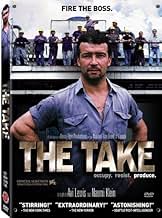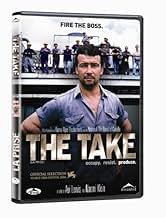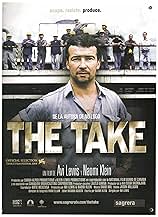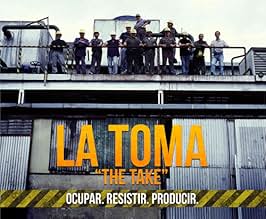IMDb RATING
7.6/10
1.2K
YOUR RATING
In the wake of Argentina's economics collapse of 2001, factory workers break into abandoned factories and restart production. Could these pioneers of cooperative ownership be a model for reb... Read allIn the wake of Argentina's economics collapse of 2001, factory workers break into abandoned factories and restart production. Could these pioneers of cooperative ownership be a model for rebuilding Argentina's economy?In the wake of Argentina's economics collapse of 2001, factory workers break into abandoned factories and restart production. Could these pioneers of cooperative ownership be a model for rebuilding Argentina's economy?
- Awards
- 1 win & 5 nominations total
Bill Clinton
- Self
- (archive footage)
Gustavo Cordera
- Self (singer)
- (as Bersuit)
Carlos Saúl Menem
- Self
- (as Carlos Menem)
Juan Domingo Perón
- Self
- (archive footage)
- Director
- Writer
- All cast & crew
- Production, box office & more at IMDbPro
Featured reviews
The collapse of Argentina's peso in 2001 threw millions out of work and plunged what had been one of Latin America's most prosperous countries in the 1990s into the kind of economic depression not seen in the United States since the 1930s. Four years later thousands of ruined businesses remain closed. In a handful of cases, though, workers occupied and reopened shut factories, health clinics, and schools as employee-owned and operated- cooperatives.
How Argentine workers did this is a terrific story. Unfortunately, "The Take", a film directed and narrated by anti-globalization activists Naomi Klein and Avi Lewis raises more questions than it answers.
According to Klein and Lewis, Argentine workers now run more than 200 companies employing 15,000 people. To explain how this happened, the movie documents a campaign by unemployed machinists to put a casting parts plant back in business. Along the way, we see examples of other successful cooperatives, including a shop of seamstresses, a ceramic tile manufacturer, and a tractor factory.
The new worker owners featured in "The Take" are earnest and enthusiastic. They are especially moving when describing the effects of years of unemployment and how their lives have improved for the better after returning to work. No one, though, tells us basic facts about these companies, such as whether wages and benefits have gone up or down under cooperatives, how the worker-owned companies pay for their raw materials, who buys their products, and if they make a profit. These are not idle points, as any owner Argentine worker or multinational plutocrat -- knows.
How does the "The Take" fill up its time? In between interviews with cooperative members about the glories of worker control we get lectures about the lack of differences among candidates in the 2003 Argentine presidential election, the pointlessness of voting, and the failings of the International Monetary Fund. We're also treated to a long slow motion sequence of a street riot in Buenos Aires complete with Mercedes Sosa soundtrack -- that depicts heroic workers and the equally heroic Klein and Lewis calling each other on their cell phones.
There's a good documentary to be made about what has happened to Argentina's economy and its workers. Klein and Lewis, however, take the easy way out and give us slogans and mushy analysis that leave the audience skeptical and suspicious.
4/10
How Argentine workers did this is a terrific story. Unfortunately, "The Take", a film directed and narrated by anti-globalization activists Naomi Klein and Avi Lewis raises more questions than it answers.
According to Klein and Lewis, Argentine workers now run more than 200 companies employing 15,000 people. To explain how this happened, the movie documents a campaign by unemployed machinists to put a casting parts plant back in business. Along the way, we see examples of other successful cooperatives, including a shop of seamstresses, a ceramic tile manufacturer, and a tractor factory.
The new worker owners featured in "The Take" are earnest and enthusiastic. They are especially moving when describing the effects of years of unemployment and how their lives have improved for the better after returning to work. No one, though, tells us basic facts about these companies, such as whether wages and benefits have gone up or down under cooperatives, how the worker-owned companies pay for their raw materials, who buys their products, and if they make a profit. These are not idle points, as any owner Argentine worker or multinational plutocrat -- knows.
How does the "The Take" fill up its time? In between interviews with cooperative members about the glories of worker control we get lectures about the lack of differences among candidates in the 2003 Argentine presidential election, the pointlessness of voting, and the failings of the International Monetary Fund. We're also treated to a long slow motion sequence of a street riot in Buenos Aires complete with Mercedes Sosa soundtrack -- that depicts heroic workers and the equally heroic Klein and Lewis calling each other on their cell phones.
There's a good documentary to be made about what has happened to Argentina's economy and its workers. Klein and Lewis, however, take the easy way out and give us slogans and mushy analysis that leave the audience skeptical and suspicious.
4/10
10protek22
The Take is one of the most informative economic and political documentaries currently available. The issues Ms. Klein and her colleagues chronicle, are of extreme importance for anyone seeking to gain a factual understanding of today's most pressing economic and political issues. Argentina had been a poster child for the globalization and neoliberal economic policies promoted by the U.S., the World Bank, and the IMF. While these policies are still being widely hailed by the mainstream media as the wave of the future, their truly destructive nature is actually understood by very few. This film allows the viewer to witness the catastrophic economic and political challenges that brought Argentina to it's knees, and the inspired solution implemented by Argentinian workers, as they rallied from the depths of economic and political despair, to redeem themselves from the clutches of corrupt politicians, and global financiers.
the worker owned factories in argentina are one of the best developments in recent history. i think the most interesting part of it is that people who are not ostensibly "political" have responded to a crisis by instituting something, spontaneously, that looks like it is within spitting distance of anarchosyndicalism. joe hill would be proud.
i saw this film as part of the touring show for the lost film festival, and it was easily the highlight of the show. I'm eagerly awaiting this to come to a local theater so i can see it again, and i'm going to try to get as many people as possible to go.
i saw this film as part of the touring show for the lost film festival, and it was easily the highlight of the show. I'm eagerly awaiting this to come to a local theater so i can see it again, and i'm going to try to get as many people as possible to go.
This documentary is the real "Yes, We Can", only instead of an empty political statement it's a true demonstration of "How You Can" make a real change.
When someone tells you that an enterprise cannot run without a boss and a hierarchy of power, don't believe them. Just let them watch "The Take" (La Toma) and see how it's possible to replace the "hierarchy of power" with a "network of cooperation". At first, I didn't believe it myself, but now I know it's possible. Imagine workers cooperating and taking decisions by voting, effectively managing a successful enterprise. Even if the people are inexperienced at first, even if they disagree sometimes, things can be worked out.
"The Take" simply shows something that Capitalism says cannot exist, something that's supposedly impossible: people cooperating for a common purpose, dividing profits equally, taking decisions democratically and managing the enterprise successfully. No leaders, no power struggles, just cooperation. The incentive is the common success, not just personal gain.
"The Take" is even more topical today in the so-called Global financial crisis, because it poses the question: "what should happen to a failed business? Should it be bailed out by the people only to repeat the same mistakes again? Should it be liquidated and sold for scrap metal, leaving the workers without jobs? Or should everything start anew, but this time as a democratic cooperation between workers?" So next time a business fails and the government decides to take your money to save a corporation, know that you have the right to say "NO, I deserve to be compensated. Your factory will do nicely."
I simply cannot express how inspiring and eye-opening this documentary is, you just have to see it for yourself.
When someone tells you that an enterprise cannot run without a boss and a hierarchy of power, don't believe them. Just let them watch "The Take" (La Toma) and see how it's possible to replace the "hierarchy of power" with a "network of cooperation". At first, I didn't believe it myself, but now I know it's possible. Imagine workers cooperating and taking decisions by voting, effectively managing a successful enterprise. Even if the people are inexperienced at first, even if they disagree sometimes, things can be worked out.
"The Take" simply shows something that Capitalism says cannot exist, something that's supposedly impossible: people cooperating for a common purpose, dividing profits equally, taking decisions democratically and managing the enterprise successfully. No leaders, no power struggles, just cooperation. The incentive is the common success, not just personal gain.
"The Take" is even more topical today in the so-called Global financial crisis, because it poses the question: "what should happen to a failed business? Should it be bailed out by the people only to repeat the same mistakes again? Should it be liquidated and sold for scrap metal, leaving the workers without jobs? Or should everything start anew, but this time as a democratic cooperation between workers?" So next time a business fails and the government decides to take your money to save a corporation, know that you have the right to say "NO, I deserve to be compensated. Your factory will do nicely."
I simply cannot express how inspiring and eye-opening this documentary is, you just have to see it for yourself.
I saw this on television (CBC) yesterday night and thought it was a good documentary. I had heard of the film and its topic before and was deeply intrigued. Having also read Klein's "No Logo", you could say I had more interest in this than most. Lewis and Klein move swiftly in telling their tale of Argentinian workers' plight for dignity and labour. A balanced interplay of rhetoric that appeals to the intellect and the emotions will win over many of the viewers. The length is such that the film does not become boring or drawn-out and good editing judgment focuses on relevant segments. Regardless of their take on these events in Argentina, I think everyone has something to learn from this film. A project like this gives me faith in our country's National Film Board ... also thanks to CBC Newsworld for not fearing to air this several times (even though late at night).
Details
- Release date
- Countries of origin
- Official sites
- Languages
- Also known as
- Захват
- Filming locations
- Production companies
- See more company credits at IMDbPro
Box office
- Gross US & Canada
- $30,380
- Opening weekend US & Canada
- $8,625
- Sep 26, 2004
- Gross worldwide
- $30,380
- Runtime
- 1h 27m(87 min)
- Color
Contribute to this page
Suggest an edit or add missing content


















